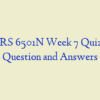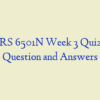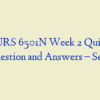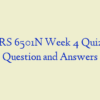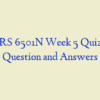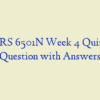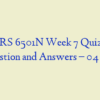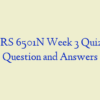Description
NURS 6501N WEEK 9 Quiz – Question and Answers
- When insulin binds to its receptors on muscle cells, an increase in glucose uptake by the muscle cells occurs. This is an example of a _____ effect by a hormone.
- If the patient has a problem with the pineal gland, which substance would the nurse monitor?
- A 12-year-old male is newly diagnosed with type 1 DM. Which of the following tests should the nurse prepare the patient to best confirm the diagnosis?
- A 30-year-old male presents to his primary care provider reporting visual disturbances. CT reveals a pituitary tumor and lab tests reveal elevated prolactin. He is diagnosed with prolactinoma. Which of the following treatments would the nurse help implement?
- If a patient had a problem with the hypothalamus, which of the following hormones would be affected?
- A 30-year-old male is diagnosed with a hormone-secreting tumor of the pancreas alpha cells. Which of the following would the nurse expect to be most likely increased in this patient?
- A 35-year-old female took corticosteroid therapy for several months. Which of the following would the nurse expect to find?
- While planning care for a patient from general anesthesia, which principle should the nurse remember? A side effect of some general anesthetic agents is _____ diabetes insipidus.
- A patient wants to know what can cause ACTH to be released. How should the nurse respond?
- When a nurse is assessing the physical features of individuals with Cushing syndrome, these findings will include:
- A patient wants to know why ADH is important in the body. What is the nurse’s best response? ADH is important in:
- A 25-year-old male presents to his primary care provider reporting changes in facial features. CT scan reveals a mass on the anterior pituitary, and lab tests reveal severely elevated growth hormone (GH). Which of the following would the nurse also expect to find?
- An endocrinologist isolated a new hormone and found it to be a water-soluble amine. Which of the following is most like this new hormone?
- A nurse is teaching a patient about insulin. Which information should the nurse include? Insulin is primarily regulated by:
- A 39-year-old female just had a baby. Which hormone will prevent excessive uterine bleeding?
- A 19-year-old female with type 1 DM was admitted to the hospital with the following lab values: serum glucose 500 mg/dl (high), urine glucose and ketones 4+ (high), and arterial pH 7.20 (low). Her parents state that she has been sick with the “flu” for a week. Which of the following statements best explains her acidotic state?
- A nurse recalls insulin has an effect on which of the following groups of electrolytes?
- A 44-year-old patient with pulmonary tuberculosis (lung infection) is evaluated for SIADH. Which of the following assessment findings would be expected in this patient?
- What common neurologic disturbances should the nurse assess for in a patient with a pituitary adenoma?
- When a patient wants to know what most commonly causes hypoparathyroidism, how should the nurse reply? It is most commonly caused by:
- A 3-year-old male was diagnosed with congenital hypothyroidism. The parents ask the nurse if left untreated what will happen. What is the nurse’s best response? If left untreated, the child would have:
- A 45-year-old female has elevated thyroxine production. Which of the following would accompany this condition?
- A 12-year-old female is newly diagnosed with type 1 DM. When the parents ask what causes this, what is the nurse’s best response?
- A 22-year-old male is admitted to the intensive care unit with a closed head injury sustained in a motorcycle accident. The injury has caused severe damage to the posterior pituitary. Which of the following complications should the nurse anticipate?
- A 40-year-old male undergoes surgery for a PTH-secreting tumor in which the parathyroid is removed. Which of the following would the nurse expect following surgery?
- A 50-year-old female presents with lightheadedness and overall abnormal feelings. Hyperaldosteronism is diagnosed. Which of the following symptoms would the nurse expect?
- While planning care for a patient with hypothyroidism, which principle should the nurse remember? The basal metabolic rate is unusually _____ with hypothyroidism.
- A 50-year-old male patient is deficient in ADH production.
- Which of the following assessment findings would the nurse expect to find?
- A 35-year-old female with Graves disease is admitted to a medical-surgical unit. While the nurse is reviewing the lab tests, which results would the nurse expect to find?
- A 54-year-old patient with pulmonary tuberculosis (lung infection) is evaluated for syndrome of inappropriate ADH secretion (SIADH). Which of the following electrolyte imbalances would be expected in this patient?
- Visual disturbances are a common occurrence in patients with untreated Graves disease. The endocrinologist explains to the patient that the main cause of these complications is:
- A 50-year-old male patient presents with polyuria and extreme thirst. He was given exogenous ADH. For which of the following conditions would this treatment be effective?
- A 15-year-old female presents with breast discharge, dysmenorrhea, and excessive excitability. Tests reveal that all her pituitary hormones are elevated. What does the nurse suspect as the most likely cause for these assessment findings?
- A 25-year-old male presents with fatigue, constipation, and sexual dysfunction. Tests reveal all pituitary hormones are normal and no masses are present. The nurse suspects the most likely cause of his symptoms is a dysfunction in the:
- A student asks the instructor which of the following is the most potent naturally occurring glucocorticoid. How should the instructor respond?
NURS 6501N Week 9
- A 22-year-old male is admitted to the intensive care unit with a closed head injury sustained in a motorcycle accident. The injury has caused severe damage to the posterior pituitary. Which of the following complications should the nurse anticipate?
- A 39-year-old female just had a baby. Which hormone will prevent excessive uterine bleeding?
- A 15-year-old female presents with breast discharge, dysmenorrhea, and excessive excitability. Tests reveal that all her pituitary hormones are elevated. What does the nurse suspect as the most likely cause for these assessment findings?
- While planning care for a patient with hypothyroidism, which principle should the nurse remember? The basal metabolic rate is unusually _____ with hypothyroidism.
- When insulin binds to its receptors on muscle cells, an increase in glucose uptake by the muscle cells occurs. This is an example of a _____ effect by a hormone.
- A 19-year-old female with type 1 DM was admitted to the hospital with the following lab values: serum glucose 500 mg/dl (high), urine glucose and ketones 4+ (high), and arterial pH 7.20 (low). Her parents state that she has been sick with the “flu” for a week. Which of the following statements best explains her acidotic state?
- If the patient has a problem with the pineal gland, which substance would the nurse monitor?
- If a patient had a problem with the hypothalamus, which of the following hormones would be affected?
- A nurse recalls insulin has an effect on which of the following groups of electrolytes?
- A patient wants to know what can cause ACTH to be released. How should the nurse respond?
- A 30-year-old male is diagnosed with a hormone-secreting tumor of the pancreas alpha cells. Which of the following would the nurse expect to be most likely increased in this patient?
- A 12-year-old female is newly diagnosed with type 1 DM. When the parents ask what causes this, what is the nurse’s best response?
- When catecholamines are released in a patient, what should the nurse assess for?
- A student asks the instructor which of the following is the most potent naturally occurring glucocorticoid. How should the instructor respond?
- A 40-year-old male undergoes surgery for a PTH-secreting tumor in which the parathyroid is removed. Which of the following would the nurse expect following surgery?
- A 54-year-old patient with pulmonary tuberculosis (lung infection) is evaluated for syndrome of inappropriate ADH secretion (SIADH). Which of the following electrolyte imbalances would be expected in this patient?
- A 45-year-old female has elevated thyroxine production.
- Which of the following would accompany this condition?
- A 50-year-old male patient is deficient in ADH production. Which of the following assessment findings would the nurse expect to find?
- A patient wants to know why ADH is important in the body. What is the nurse’s best response? ADH is important in:
- A 25-year-old male presents with fatigue, constipation, and sexual dysfunction. Tests reveal all pituitary hormones are normal and no masses are present. The nurse suspects the most likely cause of his symptoms is a dysfunction in the:
- A 30-year-old male presents to his primary care provider reporting visual disturbances. CT reveals a pituitary tumor and lab tests reveal elevated prolactin. He is diagnosed with prolactinoma. Which of the following treatments would the nurse help implement?
- Visual disturbances are a common occurrence in patients with untreated Graves disease. The endocrinologist explains to the patient that the main cause of these complications is:
- An endocrinologist isolated a new hormone and found it to be a water-soluble amine. Which of the following is most like this new hormone?
- When a patient wants to know what most commonly causes hypoparathyroidism, how should the nurse reply? It is most commonly caused by:
- A 22-year-old female has a low level of TSH. What condition does the nurse expect the patient is experiencing?
- A patient has researched lipid-soluble hormones on the Internet. Which information indicates the patient has a good understanding? Lipid-soluble hormone receptors cross the plasma membrane by:
- A nurse is caring for a patient with SIADH. What severe complication should the nurse assess for?
- A 44-year-old patient with pulmonary tuberculosis (lung infection) is evaluated for SIADH. Which of the following assessment findings would be expected in this patient?
- A nurse is preparing to teach a patient about Addison disease. Which information should the nurse include? The most common cause of Addison disease is:
- A 12-year-old male is newly diagnosed with type 1 DM. Which of the following tests should the nurse prepare the patient to best confirm the diagnosis?
- Diabetes insipidus, diabetes mellitus (DM), and SIADH share which of the following assessment manifestations?
- A nurse is teaching a patient about insulin. Which information should the nurse include? Insulin is primarily regulated by:
- Which principle should the nurse include while planning care for a patient with an ADH problem? ADH release from the posterior pituitary is stimulated by:
- An aide asks the nurse what is the most common cause of elevated levels of antidiuretic hormone (ADH) secretion. How should the nurse respond?
- If a patient’s posterior pituitary is removed, which hormone would the nurse expect to decrease?
NURS 6501N Week 9 Quiz
- When insulin binds to its receptors on muscle cells, an increase in glucose uptake by the muscle cells occurs. This is an example of a _____ effect by a hormone.
- A patient has high levels of hormones. To adapt to the high hormone concentrations, the patient’s target cells have the capacity for:
- A 3-year-old male was diagnosed with congenital hypothyroidism. The parents ask the nurse if left untreated what will happen. What is the nurse’s best response? If left untreated, the child would have:
- A patient has researched lipid-soluble hormones on the Internet. Which information indicates the patient has a good understanding? Lipid-soluble hormone receptors cross the plasma membrane by:
- Which principle should the nurse include while planning care for a patient with an ADH problem? ADH release from the posterior pituitary is stimulated by:
- A 54-year-old patient with pulmonary tuberculosis (lung infection) is evaluated for syndrome of inappropriate ADH secretion (SIADH). Which of the following electrolyte imbalances would be expected in this patient?
- A 15-year-old female presents with breast discharge, dysmenorrhea, and excessive excitability.
- Tests reveal that all her pituitary hormones are elevated. What does the nurse suspect as the most likely cause for these assessment findings?
- A 50-year-old male patient is deficient in ADH production. Which of the following assessment findings would the nurse expect to find?
- A 25-year-old male presents to his primary care provider reporting changes in facial features. CT scan reveals a mass on the anterior pituitary, and lab tests reveal severely elevated growth hormone (GH). Which of the following would the nurse also expect to find?
- An endocrinologist isolated a new hormone and found it to be a water-soluble amine. Which of the following is most like this new hormone?
- What common neurologic disturbances should the nurse assess for in a patient with a pituitary adenoma?
- A nurse is teaching a patient about insulin. Which information should the nurse include? Insulin is primarily regulated by:
- While planning care for a patient from general anesthesia, which principle should the nurse remember? A side effect of some general anesthetic agents is _____ diabetes insipidus. (nurs 6501n week 9)
- A patient wants to know why ADH is important in the body.
- What is the nurse’s best response? ADH is important in:
- A 39-year-old female just had a baby. Which hormone will prevent excessive uterine bleeding?
- A 50-year-old male patient presents with polyuria and extreme thirst. He was given exogenous ADH. For which of the following conditions would this treatment be effective? (nurs 6501n week 9)
- A 19-year-old female with type 1 DM was admitted to the hospital with the following lab values: serum glucose 500 mg/dl (high), urine glucose and ketones 4+ (high), and arterial pH 7.20 (low). Her parents state that she has been sick with the “flu” for a week. Which of the following statements best explains her acidotic state?
- A 12-year-old male is newly diagnosed with type 1 DM. Which of the following tests should the nurse prepare the patient to best confirm the diagnosis? (nurs 6501n week 9)
- If the patient has a problem with the pineal gland, which substance would the nurse monitor?
- A 25-year-old female with Graves disease is admitted to a medical-surgical unit. Palpation of her neck would most likely reveal:
- A 30-year-old male presents to his primary care provider reporting visual disturbances. CT reveals a pituitary tumor and lab tests reveal elevated prolactin. He is diagnosed with prolactinoma. Which of the following treatments would the nurse help implement?
- A nurse recalls insulin has an effect on which of the following groups of electrolytes?
- Diabetes insipidus, diabetes mellitus (DM), and SIADH share which of the following assessment manifestations?
- A 44-year-old patient with pulmonary tuberculosis (lung infection) is evaluated for SIADH. Which of the following assessment findings would be expected in this patient?
- A 22-year-old male is admitted to the intensive care unit with a closed head injury sustained in a motorcycle accident. The injury has caused severe damage to the posterior pituitary. Which of the following complications should the nurse anticipate?
- A 40-year-old male undergoes surgery for a PTH-secreting tumor in which the parathyroid is removed. Which of the following would the nurse expect following surgery?(nurs 6501n week 9)
- A 50-year-old female presents with lightheadedness and overall abnormal feelings. Hyperaldosteronism is diagnosed. Which of the following symptoms would the nurse expect?
- A 45-year-old female has elevated thyroxine production.
- Which of the following would accompany this condition?
- A 25-year-old male presents with fatigue, constipation, and sexual dysfunction. Tests reveal all pituitary hormones are normal and no masses are present. The nurse suspects the most likely cause of his symptoms is a dysfunction in the:
- A 30-year-old male is diagnosed with a hormone-secreting tumor of the pancreas alpha cells. Which of the following would the nurse expect to be most likely increased in this patient? (nurs 6501n week 9)
- When a patient wants to know what most commonly causes hypoparathyroidism, how should the nurse reply? It is most commonly caused by:
- An aide asks the nurse what is the most common cause of elevated levels of antidiuretic hormone (ADH) secretion. How should the nurse respond?
- Visual disturbances are a common occurrence in patients with untreated Graves disease. The endocrinologist explains to the patient that the main cause of these complications is:
- When catecholamines are released in a patient, what should the nurse assess for?
- If a patient’s posterior pituitary is removed, which hormone would the nurse expect to decrease?
- So, check out our latest Tutorials and Courses on BUSI 413.
![]()


